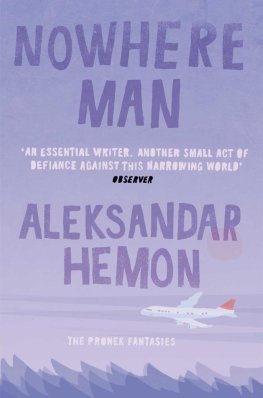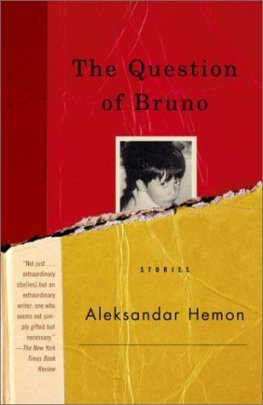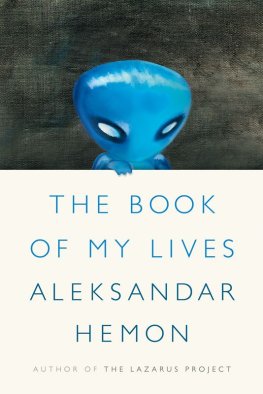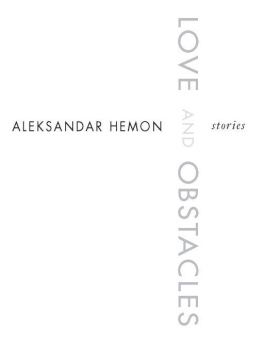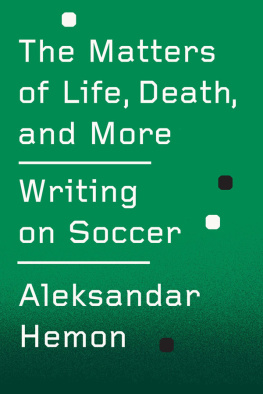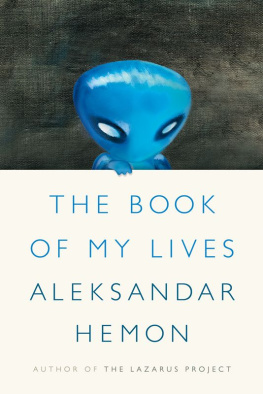Aleksandar Hemon
Nowhere Man
Ordinary facts are arranged within time, strung along its length as on a thread. There they have their antecedents and their consequences, which crowd tightly together and press hard one upon the other without any pause. This has its importance for any narrative, of which continuity and successiveness are the soul.
Yet what is to be done with events that have no place of their own in time; events that have occurred too late, after the whole of time has been distributed, divided and allotted; events that have been left in the cold, unregistered, hanging in the air, errant and homeless?
Bruno Schulz, from The Age of Genius

CHICAGO, APRIL 18, 1994
Had I been dreaming, I would have dreamt of being someone else, with a little creature burrowed in my body, clawing at the walls inside my chest a recurring nightmare. But I was awake, listening to the mizzle in my pillow, to the furniture furtively sagging, to the house creaking under the wind assaults. I straightened my legs, so the blanket ebbed and my right foot rose out of the sludge of darkness like a squat, extinguished lighthouse. The blinds gibbered for a moment, commenting on my performance, then settled in silence.
I closed the bathroom door and the hooked towels trembled. There was the pungent smell of the plastic shower curtain and disintegrating soap. The toilet bowl was agape, with a dissolving piece of toilet paper in it throbbing like a jellyfish. The faucet was sternly counting off droplets. I took off my underwear and let it lie in a pile, then stepped behind the curtain and let the water run. Wee rainbows locked in bubbles streamed into the inevitable, giddy whirl, as I fantasized about melting under the shower and disappearing into the drain.
I went down the stairs, carrying a mound of dirty laundry, careful not to trip over the inquisitive cat. I put the laundry on top of the washing machine, which shuddered as though delighted, and pulled the rope pending in the darkness cobwebs sprung into the air around the bulb. I had to wait for the spin to throttle to a stop before I could put my laundry in the machine, so I followed the cat into the other room. There were boxes full of things that must have been left by the tenants who might they have been? who used to live in one of the apartments: wallpaper scrolls, a broken-boned umbrella, a soulless football, a bundle of shoes with crescent soles, a pictureless frame, skeins of anonymous dust. Back in the laundry room, I transferred the sodden clothes of the upstairs people to the dryer, then loaded the washing machine. In the other room, the cat was galloping around and producing noises of struggle, pursuing something I could not see.
Today was the interview day. I had called years ago, it seemed now and set up an interview for an ESL teaching job, strictly out of despair. I had been laid off from the Art Institute bookstore once the merry Christmas season, including the mad aftermath of the Big Sale, was over. My job there had been to unpack boxes of books, shelve the books, and then smash the boxes and throw them away. Smashing the boxes was my favorite part, the controlled, benign destruction.
Two white eggs roiled in the boiling water, like iris-less eyes. The floor was sticky, so I had to unpeel my bare soles from the floor with every step I thought of the movies in which people walk on the ceiling, upside down. A cockroach was scuttling across the cutting board, trying to reach the safety behind the stove. I imagined the greasy warmth, the vales of dirt, the wires winding like roads. I imagined getting there, still clutching a crumb of skin, after almost being cut in half by something immense coming down on me.
I had tried other bookstores, but they didnt want me. I had tried getting a job as a waiter, elaborately lying about my previous waiting experience in the best Sarajevo restaurants, high European class all, and nonexistent on top of that. I had spent my measly savings and was in the furniture-selling phase. I sold, for the total of seventy-four dollars, a decaying futon with a rich cat-barf pattern; a hobbly table with four chairs, inexplicably scarred, as if they had walked through fields of barbed wire. I was late with my rent, and had already looked up the word eviction in the dictionary, hoping that the secondary, obsolete meaning (The action of conquering a country or of obtaining something by conquest) would override my landlords primary meaning and save my ass.
The frighteningly simple thing was that when I was inside nobody was on the porch: the green plastic chairs convened around nothing; the swing still quaked under invisible weight; the empty flowerpots faced out, like Easter Island heads. A fly buzzed against the windowpane, as though trying to cut through it with a minikin saw. In the house across the street, a bare-chested man, skinny like a camp inmate his shoulder-bones protruding, his trunk striped with rib shadows was coming in and out of his house feverishly, only to disappear into it in the end. I was about to lock the door when I saw the cat gnawing on a mouses head, patiently exposing its crimson essence.
And it hadnt been just the money. When I couldnt smash the boxes, I had obsessively read the papers and watched TV (until I sold it) to see what was happening back home. What was happening was death. I had looked up that word too: The act or fact of dying; the end of life; the final and irreversible cessation of the vital function of a plant or an animal.
The air was oily and warm, and I stood on the street inhaling. There had been a time when that scent marked the beginning of marble season: the ground would soon be soft and you didnt have to wear gloves; you could keep your hands in your pockets waiting for your turn, revolving marbles with the tips of your fingers until a red line appeared across your palm, marking the border between the part of your palm that was inside and the one that was outside. You would kneel and indent the soil with your knees, imprinting smudges on your trousers, progressing toward an inexorable punishment from your parents. I had a couple of marbles in my pockets, plus an El transfer card, creased and fragile.
A woman with spring freckles, towed by a giant Akita, smiled at me for no apparent reason, and I stepped off the pavement confused by the smile, scared by the Akita onto the ground. I let the woman pass, and then walked slowly, as if walking through deep water, because I didnt want her to think that I was following her. The Akita was sniffing everything, frantically collecting information. The woman turned around and looked at me again. The sun was behind my back, so she squinted, wrinkling the ridge of her nose. She seemed to be on the verge of saying something, but the Akita pulled her away, almost ripping her arm off. I was relieved. I preferred being a vague, pleasant memory to having to explain who I was or telling her that I had no job, and when I had one I was smashing boxes.
A teenager in a window-throbbing car drove by, pointing his finger at me, shooting. I crossed the street to look at a sheet of paper pinned to a tree in front of a building exuding dampness. The sign read in red letters:
LOST DOG
I LOST MASCULINE DOG, THIS COCTAIL SPANIEL AND HIS NAME LUCKY BOY. HE HAS LONG, LONG EARS AND CURVE HAIR GOLD BROWN COLOR WITH SHORT TAIL ALSO HE IS VERY FRIENDLY. LITTLE CRAZY. IF ANYONE FOUND MY DOG PLEASE PLEASE CONTRACT MARIA.
MARIA
Outside the El station, a man with a black bowler hat was rattling his tambourine, out of any recognizable rhythm, singing a song about the spirit in the sky in a flat, disenchanted voice. The man smiled at me, showing dark gaps between his teeth. When I was a boy, spitting between your teeth was considered a great skill, because you could achieve precision, like those snakes in

